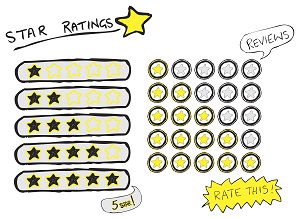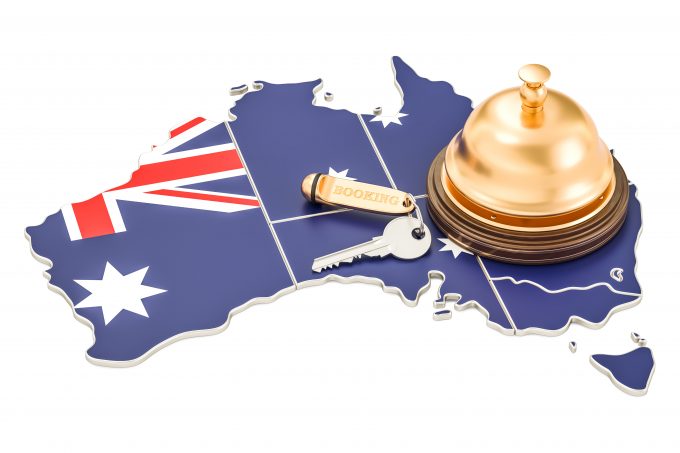
Do star ratings still influence consumer bookings?
Opinion is divided on whether a star rating holds enough power to sway guests in a world increasingly governed by the internet. accomnews asked a variety of industry voices their opinion on the subject, and received a suitably varied response.
Do you think star ratings affect consumer booking decisions or have they lost their significance and why?
Geoff Hussin, resort manager, Ivory Palms Resort, said:
The buildings that kept their rating say it is fantastic and has more importance than ever. These buildings are now comfortable with the ratings and have no fear of the system. For the buildings that suffered they are moving away from the ratings or trying to work out if it is still worthwhile. It is really messy and in my opinion the only way that it can work for the majority now is if Star Ratings Australia comes around and does an inspection with the view of advising the managers on how it works and how we can achieve our previous ratings if we have suffered.
The rules have changed for buildings that were on the cusp of a star or a half-star and there is little understanding and a real fear that if the rating drops again the best option is to self-rate. A self-rating does not carry as much weight, however, with an increasing amount of buildings becoming self-rated the community is becoming accustomed to seeing them. This system needs some real consultation as it is not the system that is wrong, it is the fear and misunderstanding that is the problem.
Carol Giuseppi, CEO, Tourism Accommodation Australia said:
Changes to the hotel industry and the power of the Internet have certainly affected the role of accommodation rating services.
A credible star rating system that is well-respected and administered will always be a great asset for the industry, particularly for non-branded, independent hotels because it will provide a good indication of the quality of the property.
What has changed in the past twenty years has been the rise of powerful global hotel brands which come with their own guarantee of facilities and services. Hotel groups and owners spend millions continually upgrading their hotels to maintain brand consistency, and with so many online review sites, they know that any fluctuation in brand standards will be highlighted. Major hotel groups have a very strong incentive to deliver the brand promise, and with increased globalisation, travellers are now far more demanding in what they expect from hotels.
Stand alone hotels, on the other hand, especially in regional areas, can’t rely on brand reputation and therefore benefit from an independent ratings service. Not only does it reward hotel owners for investing in facilities and service, it provides a level of confidence for the travelling public, which in turn encourages greater domestic travel.
Rachel Argaman, CEO, TFE Hotels, said:
I do think star ratings still affect consumer decisions as it remains a system of categorisation they know and use for classifying hotels.
However more and more people are looking at consumer generated media and particularly at TripAdvisor rankings and very few leisure guests will choose a hotel without checking it out on TripAdvisor.
Richard Munro, CEO, Accommodation Association of Australia, said:
Star Ratings Australia has been reinvigorated by the current team, led by Damien Hanger to a more relevant, independent and consumer-friendly platform. The inclusion of consumer sentiment with ReviewPro has been welcomed by the industry as consumer sentiment is, and should play a role in evaluating services of accommodation properties.
With the emergence of non-compliant accommodation options such as Airbnb that do not even meet basic safety measures, the star ratings program has never been more relevant than right now for consumers to identify fully compliant establishments that offer a high degree of safety, comfort and a duty of care to their guests.
A TripAdvisor spokesperson said:
Official star ratings, usually awarded to accommodations by a country’s tourism board, are based on established criteria and guidelines, and can help travellers understand the amenities and services they can expect from an accommodation.
TripAdvisor reviews and bubble ratings provide insight into travellers’ experiences at that accommodation. Both offer different insights into a property and when used together they help travellers to make a more informed decision about where they want to stay.
Tony Sheer, general manager, ARRA Accommodation Group, said:
Yes, star ratings do have a role to play in selecting accommodation. Due to inconsistencies and disparity, they are losing relevance among consumers.
With strong individual brand awareness and increased online customer reviews and engagement, it can often play a lesser role within certain market segments. Other platforms like TripAdvisor, social media, and Google Hotel Finder now influence the guest’s decision.
Consumer reviews provide the detailed information that star ratings do not and are therefore playing a large role in determining choice of accommodation.
Mark Loneragan, general manager, Golden Chain, said:
Yes. However, to what level for each person in each demographic will vary widely I would suspect. They have certainly lost the significance they had in the 70s when they gave travellers a unique guide when trying to choose between the hundreds of independent hotels and motels.
Now, with brand reputation as well as online reviews at your fingertips, there are other options for assessing your choices. I’m also not a fan of the fact that operators have been poorly managed over the years or that assessors seemingly ran their own races, nor that now, assessments only occur every three years although the latter is bound to be a commercial reality.
Fact is, stars are still the only independent, standardised, verified measure of quality we have in the country and I must admit, they are a recognised icon and to certain degree, yes, would influence a consumer’s decision.
Other than our brand standards which are constantly being re-evaluated, what other standard or guide does a customer, domestic, international, corporate or otherwise have to go on?
At the Australian Tourism Exchange recently, during discussions with score of international wholesalers, star ratings was mentioned repeatedly as an indicator of quality. It was given as a reason and ‘insurance’ as to why a certain property or chain was recommended to a travel agent for lack of any other standardised, verified measure.
A bonus I like too is the inclusion of ReviewPro, the online review aggregation tool. Our members are utilising it to the full and apparently gaining great benefit from it and I am informed that, in the event of a disagreement of dispute, the consumer rating is used as a guide for the independent review panel.
One hundred and eighty of our over two hundred and forty members are star rated and I am a fan of seeing this number grow. Golden Chain has previously paid the fees and required a star rating, something that stopped when the fees became prohibitive and the standards inconsistent. Now however with fees reasonable and the inclusion of social media aggregation, I can only wonder “why not?”
Peter White, general manager, Desert Gardens Hotel, Emu Walk Apartments, said:
I certainly believe that star ratings do affect customer booking decisions. The majority of guests have an expectation of the accommodation they are booking dependent upon the star rating of the property. Guest expectations are naturally aligned with a property’s star rating and this does affect booking decisions.
Mike Kinloch, spokesman, SiteMinder, said:
Absolutely. Research shows us that online reviews still play in a role in educating consumers about their decisions before they made a booking. Earlier this year, for example, it was found that more than 40 per cent of travellers in the UK still relied on the opinion of others online – strangers from all walks of life, people they’ve never even met before – when making a purchase. And what this proves is that in today’s consumer-led economy, it is still crucial for hotels to become fully engaged with a guest at every touch point of their buying journey.
This said, with the emergence of so many channels online – from OTAs, metasearch sites and even a hotel’s own website – consumers now have so many more avenues to gain their information and they no longer just look at review sites.
They often look at all of these sources and make their booking decisions based not only on the ratings and opinions of others, but the services a hotel can provide, if they’re offering packages and, ultimately, what their room rates are. Again, this means that as a hotel, it’s vital that you’re visible on multiple channels.
Zed Sanjana, CEO, Quest Serviced Apartments, said:
We left probably 18 months ago now and we haven’t really seen a huge impact on our business as a result to be frank. I think people still have an idea of what star ratings are but I think that the relevance was probably a lot stronger 15 years ago when people didn’t have as much access to information about a property as they do today.
So I think that travellers these days are a lot more educated and informed and do a lot more research before they book. Star ratings have a place but with the amount of information that’s available to them now they probably look at other things whether its videos, photos, reviews, there are lots of data points available to travellers now that 15 years ago weren’t there and all people had to go off was maybe a star rating or a brand name.
accomnews also approached Star Ratings Australia for their thoughts on the matter, receiving the following response:
All of the major OTAs such as Booking.com, Wotif and Expedia, as well as TripAdvisor, refer to a “hotel class” rating and use stars as a primary feature of their consumer search filters. We can only assume from this widespread and continued practice that star ratings indeed affect consumer booking decisions.
Tourism Ireland surveyed 26,000 international travellers in 2014 as part of a United Nations World Tourism Organisation report into the future of world accommodation classification systems. Key findings showed that star ratings are valued or important for global travellers. The data supported our own independent research from 2011 that found that 85 per cent of Australian travellers use the stars when choosing and booking accommodation.
What has impacted the relevance of star ratings in Australia has been the introduction of self-ratings. Ironically, this practice blatantly acknowledges the value of a rating system to help consumers choose and book the right accommodation. Why else would they use the same 1-to-5 point scale, including half-dots? And for a self-rating not to involve a false or misleading representation then it must be consistent with an official industry standard such as our independent star rating scheme.
The value of consumer ratings is undeniable and the online reputation of a property is critical to its commercial performance. Like the use of star ratings to help consumers filter and refine their search criteria, OTAs were quick to adopt and incorporate past guest ratings and reviews on their websites. All because they affect consumer booking decisions.
Of the 70 independent accommodation classification systems in the world, we are the second to introduce a consumer voice to our scheme. Powered by ReviewPro, a global leader in the provision of guest intelligence solutions, we now display an aggregate travellers’ rating alongside our independent star rating. Our independent travellers’ rating represents what past guests are saying about a property from more than 140 websites in 45 different languages. Similarly, our licensees can now access a free ReviewPro dashboard of their past guest ratings and reviews to manage their online reputation effectively and efficiently.
We are proud to represent Australia’s most reputable accommodation operators, or those who continue to hold themselves to independent quality standards. And we are equally proud to be one of the first rating schemes in the world to incorporate a consumer rating model.
We switched to a three-year review cycle to reflect industry best practice for managing their assets. The old 12-month cycle defied logic in context of the quality-based criteria introduced in 2010-11. The introduction of a consumer voice enables us to monitor and publish property performance on a day-to-day basis according to their past guest ratings and reviews and via the aggregate travellers’ rating (powered by ReviewPro).
We have proven complaint procedures in place whereby if a consumer complains about our rating standard and substantiates a major cleanliness or condition issue, we engage mystery guest services from the Accommodation Association of Australia to visit the property unannounced.
We also have proven rating dispute procedures in place. If a property doesn’t agree with our rating result and I cannot resolve the issue with them directly, then I will refer the matter to a sub-committee of the Accommodation Association of Australia board to undertake a peer review and to provide an independent recommendation.

AccomNews is not affiliated with any government agency, body or political party. We are an independently owned, family-operated magazine.






